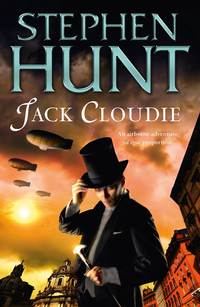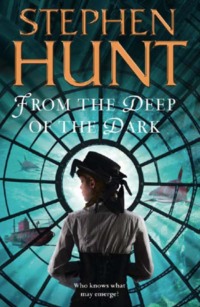
Полная версия
The Court of the Air
His grey future, ensnared between the invisible walls of his prison-in-exile at Hundred Locks, was growing smaller and smaller as he drifted off into an uneasy sleep.
Chapter Three
Surveillant Forty-six nudged the telescope a touch to the left with the foot pedal. It took a couple of seconds for the transaction engine to balance the array of mirrors, the image in the rubber face-glove losing focus before returning to sharpness with a clack – clack – clack. From the corner of his eye, Surveillant Forty-six could see the other surveillants riding the cantilevered brass tubes, cushioned red seats attached underneath the large cannon shapes of the telescopes.
The scopes followed the arc of the monitorarium, curving around the inside wall of the sphere. A gantry and rail ran behind their telescopes, monitors in grey court-issue greatcoats treading the iron plates. You could almost see the chill in the monitorarium – no heat that might interfere with the operation of the viewings.
‘Your report please.’ It was Monitor Eighty-one. She was always brusque and efficient. The wires in his earphones looped back to the gantry, to a voice trumpet where Eighty-one was bending down to speak.
The monitor was one of the new batch, fresh out of training, one of the ones who thought that relaying reports through, was the same as reporting to. He harrumphed. She lacked even the slight worldsinger craft the surveillants practised. Kicking her feet along the gantry in her fur-lined boots to prevent frostbite, unable to heat her body with her mind. Wearing one of the surveillant’s own leather skins would see her frozen to death in a telescope sling before the end of her first watch. Unable even to modify her blood after sampling one of the many potions the surveillants took to stay awake and focused, weeks at a shift.
‘This unit is still pulling slightly to the left,’ complained Surveillant Forty-six. ‘I thought a mechomancer had taken the telescope up to the maintenance level.’
‘Stop your whining,’ hissed the monitor. ‘This is a priority observation – someone could be listening. It might be for the old lady herself. You lose the plot on this job and there’ll be bloody analysts crawling all over us. Just give me your report.’
The surveillant held his tongue. Priority it may be, but not high enough to get his scope pulled out of the monitorarium and into the maintenance schedule, it seemed. ‘Target’s aerostat arrived at the Hundred Locks field as scheduled. Target was escorted to the contact’s house, as anticipated. Target has remained there for the last seven hours. Do you have any analyst predictions or instructions?’
‘There is an eighty-seven per cent chance the target will remain in the house for the next sixteen hours. Maintain surveillance.’
The surveillant sighed. ‘Preparing for night-time sighting.’ He pulled a drinking tube from the telescope, supping at the orange gloop that dribbled out. The potion warmed his skull as sparks fireworked across his eyes; the brew’s night vision would last until sunrise. As the liquid coursed through his body, he reached inside himself with one of the worldsinger magics, rendering the potion inert before it struck his liver, where the strange brew would have ruptured that organ into a broiled stew.
He gazed back into the rubber mask and centred the view on the smokeless chimney of Seventy Star Hall. True to form, the scope slid to the left. He cursed the bureaucrats of the Court. Silently.
Chapter Four
It was hard to predict when the Whisperer would come to Oliver in his dreams. Sometimes he could go for weeks without a visitation – other times the Whisperer might come four nights in a row.
Oliver was in a large palace somewhere, his uncle, Damson Griggs and others running through the corridors, trying to find a missing chair. The chair was important, obviously. Oliver knew it was a dream because he had never met the King, and the not-so-merry monarch said if they could only find the chair, parliament might agree to sow his arms back on. Then the Whisperer pushed through into the dream.
‘Oliver, I can see you. Can you see me?’
‘I can’t see you, Whisperer, go away.’
‘Then you can, Oliver,’ hissed the misshapen form that had appeared before him. ‘I can connect with you. I can connect with almost all of our kind.’
‘I’m not like you, Whisperer,’ said Oliver.
‘No. I realize that, Oliver. You are the best of us. I have waited a lifetime or more for you to arrive. The others think they’re perfect, the ones who aren’t locked up in here with my friends and me. But they haven’t met you, Oliver. If they had they wouldn’t be so proud, so vain, so content with themselves and their powers.’
Oliver knew they kept the Whisperer locked somewhere dark, deep beneath the earth. Chained in by hexes and curse-walls and powerful worldsinger gates. His ugly lumpen face was beyond description, a wreckage of human flesh. When the Whisperer had been born, his terrified parents must have run a league in the opposite direction.
‘Can’t you get out of my mind?’ pleaded Oliver. ‘Get out of my life?’
‘You are my life, Oliver,’ hissed the creature. ‘You and the others I contact. Do you think my own life is worth the living? They keep me in the dark, Oliver, alone in a cell hardly tall enough to stand up in so I can’t rush the warders when they remember to check I’m still here. The rats visit me, Oliver. Drawn by my smell and waste. I break my teeth on their bones, sometimes, when the warders forget to feed me.’
Oliver felt sick. ‘And what do they taste like?’
The Whisperer laughed, a sound like air escaping from an expansion engine. ‘What do they taste like, Oliver? Like chicken, Oliver, like the finest roast chicken. I borrowed the taste from your mind. I hope you don’t mind. I have so few reference points.’
Oliver gagged and the Whisperer danced a mad little jig in front of him. ‘I try not to eat the food they give me, Oliver. They put potions in it, to soften my brain and keep me tired, sleepy.’
In the dream palace the King had appeared again, but he took one look at the Whisperer and turned smartly around.
‘How sad, Oliver. Even the phantoms in a dream find me repulsive. Remind me. This time, is it me dreaming of you, or is it you dreaming of me?’
‘What does it matter?’ Oliver shouted. ‘Leave my mind alone.’
‘Your time is coming, my perfect friend,’ said the Whisperer. ‘You are about to find out what a flexible and surprising thing life is. And when you do, you might be very glad of me crawling around in your skull. Yes, you might be very glad indeed.’
‘I am rather sure I won’t be,’ said Oliver.
‘Don’t make your mind up quite so fast, Oliver. Things have already started moving. Your curious visitor, Harry Stave. What do you think of him, boy? Bit of a dark horse, perhaps. Bit of a bludger and a broadsman?’
‘I don’t—’
‘Shhhh,’ hushed the Whisperer. ‘You’re going to get woken up in a couple of seconds.’
He was.
It was an early start to sign on the county registration book, and as always, Oliver found himself outside the Hundred Locks police station in time to see the prisoners from the night before marched away from the cells, across to the magistrate’s small office along Rayner’s Street. Among the usual string of tavern brawlers were a handful of Quatérshiftian refugees: two men and a single woman – possibly their sister.
Their clothes were ruined and Oliver guessed they had escaped across the sea, circumventing the cursewall along the border with Jackals. One of the men was shaking uncontrollably, his compatriots stunned into a shocked silence. What tales had they been told by the Commonshare’s propaganda committee? That Quatérshift had won the Two-Year War? That Jackals was now a model of Carlist right-practice? That Jackals had suffered a famine too, after replacing its farmers with Committees of Agrarian Equalization and marching its educated yeomen into a Gideon’s Collar – the steam-driven killing machines which now filled the Commonshare’s city squares?
Whatever the lies, they had not been enough to keep these three from escaping the great terror in Quatérshift. Since the Commonshare’s worldsingers had laid the cursewall, there had been so few refugees making it alive to Jackals that magistrates now granted the shifties automatic political asylum. One of the many émigré charities would be called in to help. After all, there were now more Quatérshiftian nobles sloshing around Jackals than there were back in the homeland – the lucky ones who had flooded out with their gold before the cursewall was raised. The less fortunate quality were still in Commonshare camps waiting on a piece of paper with a red number scrawled across it … followed by an iron bolt fired through the neck.
As the line of prisoners disappeared down the street, Oliver knocked on the station door and entered.
‘Oliver.’ Sergeant Cudban glanced back from locking the door to the cells. ‘That time of the week already?’
‘I’m afraid so,’ said Oliver.
‘Come on in laddie, don’t stand on ceremony. Your wee conjurer is already around the back. Would you like a nice cup of caffeel? Young Wattle’s just brewed up.’
Oliver nodded. Sergeant Cudban was a brusque, straightforward uplander, and he had little patience for the worldsingers and even less for the superior manners of Oliver’s personal tormentor, Edwin Pullinger, the county’s Inspector Royal from the State Department of Feymist.
‘A busy night?’ Oliver asked.
‘Aye, the usual. Although I did have the parson in here yesterday. Somebody’s been stuffing political pamphlets inside the book of Circlelaw.’
‘Pamphlets,’ laughed Oliver.
‘You should have seen the man’s face. The highlights of Community and the Commons, it was. I don’t think the parson had ever read it before and the thought of Carlists in the pews of his good Circlist church had him in a right tizzy.’
Oliver shrugged. ‘For that matter, I don’t think I’ve ever read it either.’
The sergeant winked at Oliver. ‘I’ll slip you a copy later then, compatriot. Never sat well with me, laddie, burning books. Them’s the sort of larks foreigners get up to, not us Jackelians. Benjamin Carl hasn’t been seen alive since eighty-one anyway, and to my mind, since the uprising was crushed most of his revolutionaries have been baking bread and milling steel for the last fifteen years.’
‘And printing pamphlets,’ Oliver added slyly.
Sergeant Cudban pinned up a reward on the wall, an illustration of a highwayman and a modest reward staring down on them. ‘Grumbles, laddie. Everyone’s got grumbles. You happy, laddie? Being dragged in here to sign on every week at the pleasure of that purple-robed prat? And do you think I’m happy? Three wee constables to keep the parliament’s law in Hundred Locks while Shipman Town above has ten times that number. What do they do all day – interview cod? Arrest gulls? And send their beered-up sailors down here to break each other’s heads in my taverns.’
Constable Wattle poked his face around the door. ‘Inspector Pullinger wants to know why he’s being kept waiting.’
‘See, laddie. Grumbles.’ The sergeant turned to his constable. ‘The Department of Feymist would not like the answer to that question, young Wattle.’
Oliver was ushered into the office. Cudban unobtrusively took up position underneath the station’s weapons rack, cleaning the cutlasses in the top row and oiling the walnut-stocked rifles below. Listening all the while. It was not unknown for the Department to resort to worldsinger mind tricks to get results – but it would not happen while old Cudban was in charge of policing the Hundred Locks Township.
The oily sorcerer had a new arrival sitting by his side, another Department of Feymist worldsinger, though not much older than Oliver. An acolyte. Pullinger rubbed his brow where a tattoo of four small purple flowers shone – the mark of his rank among the worldsingers.
Edwin Pullinger turned the register on the writing desk around and pushed it towards Oliver. ‘Your official signature, Mister Brooks. My colleague here will be counter-signing for the Department.’
Oliver picked up the stylus and dipped its nib in the inkpot. ‘Planning to retire, Inspector Pullinger?’
‘Not any time soon, young Master Brooks,’ Pullinger replied. He took out a small snuffbox of purpletwist and, measuring a pinch on the back of his hand, sniffed at the rare pollen. Addictive when inhaled, it also enhanced the power of a worldsinger. The acolyte produced a flat green crystal, tracing a line of truth sigils in the air over it.
Resigned, Oliver placed his right hand on the truth crystal while Pullinger commenced the ritual questioning.
‘Have you manifested any of the following powers of feymist abomination? Telekinesis, the power of flight, abnormal strength, mental control over animals, invisibility, the power to generate heat or flame…’ Pullinger ran through the exhaustive list.
‘I haven’t,’ said Oliver, when the sorcerer finished at last. ‘Have you?’
Sergeant Cudban snorted with amusement at the answer.
Pullinger leant forward. ‘If I had, young Master Brooks, it would have been as the result of the disciplined study of the worldsong and mastery of my own natural abilities over the bones of the world.’
‘Naturally.’
‘And that is precisely the point,’ said Pullinger. ‘By nature. Naturally. I could take the most talentless clodhopping constable in this station and with enough time and diligence teach him to tap leylines and move objects around using the worldsong.’ To demonstrate his point, the pen rose from Oliver’s hand and floated in the air to the worldsinger.
‘Don’t bother on my account,’ muttered Sergeant Cudban.
Pullinger leaned back in his chair, addressing his acolyte. ‘Young Master Brooks, as you can see, is my greatest challenge. An enigma. How much exposure to the feymist does it take on average for an abomination to occur?’
‘Anything from two minutes to an hour,’ answered the acolyte.
‘Correct,’ said Pullinger. ‘You can be sleeping soundly in your bed when a feymist rises from the soil, and the first you will know of it is when your body begins to change in the morning.’
The boy nodded.
‘Two minutes,’ Pullinger repeated. ‘Yet young Brooks’ aero-stat crashed into the very feymist curtain itself when he was just one year old. And he was found wandering out, alone, the sole survivor, four years later. Four years exposed to the feymist. Too young to feed himself. And when he resurfaces – no feybreed powers, no abominations, no memory of what happened to him behind the curtain.’
‘Perhaps I was raised by wolves,’ said Oliver.
‘Have you remembered anything of your time behind the feymist curtain since our last meeting?’
‘No,’ lied Oliver. As usual the truth crystal was not alerted by his reply.
‘Have you had any dreams you would class as unusual?’
‘No,’ lied Oliver, the Whisperer’s hiss in his ears.
‘Have you had any mental conversations with relatives you believe might be dead?’
‘No,’ said Oliver. ‘Although if I did, I really wouldn’t mind.’
Pullinger clearly did not believe a word of it. Four years exposed to the feymist and no resulting abominations. It was unheard of, an impossibility. Oliver had become his life’s work. His obsession.
‘I know you are hiding something, boy,’ said the worldsinger. ‘You may pass the crystal but you are not telling me everything, I can feel it in my gut.’
‘Been staying at the Three Bells, have you?’ muttered the sergeant. ‘We’ll have to do something about the state of their kitchen.’
Pullinger ignored the jibes. ‘What do you have to fear, Oliver? You are normal physically. You wouldn’t end up with the broken gibbering things at Hawklam Asylum, I can promise you that.’
‘I would serve.’
‘Yes, Oliver. You would serve. In the Special Guard your powers would be put to the service of the people. You would be a hero, Oliver. No longer something unknown, to be feared and loathed. But a champion of the state – protecting your countrymen from our enemies abroad and at home.’
‘With a torc around my neck,’ said Oliver. ‘Controlled by someone like you.’
‘For all our powers, Oliver, the order is still human. Trusted to contain those who clearly are not. The torc is our insurance in case a feybreed goes rogue … or insane. How many fey are ever executed by torc? None so far this year.’
Oliver shook his head. ‘I’m more human than your friends in the Department of Feymist.’
‘I know you think you have been treated badly, Oliver. But that’s the self-centred perspective of a young man who has seen nothing of life or the world. This is for your safety – and ours. You have not seen the things we have in the Department. You could go fey one night and wake up in the morning with as much in common with us as you have with the insects in your garden. You could decide to turn your uncle’s body inside out just to see what it looks like. You could walk through Hundred Locks setting people alight with your mind just to hear the difference in their screams. I have seen that happen, boy.’
‘I would never do that.’
‘People fear the feymist, Oliver. They fear it when whatever is behind the curtain seeps its poison across Jackals, changing its victims. They fear an abomination that hasn’t been tested and submitted to the people’s control.’
‘But I am normal,’ Oliver nearly shouted. ‘I’m the same as the rest of you.’
‘You can’t be the same, Oliver. Not after four years inside the feymist curtain. You are the only one who has been inside and lived to return.’
‘I don’t remember those years.’
‘What life is it here for you, Oliver? Your neighbours and friends terrified of your torcless neck, terrified you’ll wake up one day fey and rogue. Show me what you really are and let me conscript you into the Special Guard.’
‘Hundred Locks is my home.’
‘It’s your prison, Oliver. You would be happier among your own kind. Captain Flare would welcome you into the legion like a brother. Bonefire and the other champions of the guard would make you into a hero.’
Oliver remained silent.
‘The common herd worship the Guard, Oliver. There wouldn’t be a tavern in the kingdom you couldn’t walk into and have Jackelians falling over themselves to stand you a drink. And the women, Oliver. You haven’t seen how the women drool over the Special Guard; hang on their every word. You would have Dock Street writers penning your adventures in the legion into myth. All that, and what do you have here?’
‘My freedom,’ said Oliver, quietly.
‘A curious sort of freedom,’ said the sorcerer. ‘And it has come very cheap for you, so far. But the day may not be far off when you find the price of it rises.’
‘I am normal,’ Oliver protested, the words sounding hollow even as he said them. ‘Normal.’
Pullinger and his Department stooge made ready to leave. ‘You’ll slip one day, Oliver. Lose control and reveal yourself. When you do, we’ll be there to bind you. Or stop you.’
Sergeant Cudban shook his head as the two sorcerers left. A row of polished cutlasses and rifles lay on the table in front of him. ‘I admire your spirit, laddie. But are you doing yourself any favours?’
‘You think I should give him what he wants?’
Cudban shrugged. ‘I de nae know if there’s an ounce of fey in your bones, laddie, but that four years inside the feymist curtain is a life sentence as far as they’re concerned. They’ll keep you on the county register till your hair is silver and you’re walking with a stick. It’s no life for you.’
‘It’s not fair.’
‘I knew a Ham Yard detective, laddie; once he took it into his head that you were guilty, you might as well confess to the doomsman and take a shorter sentence, innocent or no. Either way they’d take you.’
‘Even if I’m not fey?’
‘Especially if you’re nae, laddie. Just tell them that old Isambard Kirkhill is sending you messages from beyond the grave – let them put a suicide torc around your neck and stick you in the Special Guard. He wasn’t lying about that. They live like Guardians down in Middlesteel. A bit of light duty protecting the people from the King. Let the heavy crushers like Captain Flare do any real fighting that parliament orders your way. I’ll be reading in The Middlesteel Illustrated about what a fine young champion of the state you are before midwinter.’
But Oliver was not thinking about the Special Guard. He was thinking about Hawklam Asylum; the sibilant venom-words of the Whisperer; what it would be like to be ensnared for the rest of his years in a dark airless cell next door to the inhuman dream walker.
Maybe it was a sixth sense – something within him finally fulfilling the Department of Feymist’s expectations – but Oliver knew something was wrong the moment he opened the back door to Seventy Star Hall. Everything in the lumber-room was as it should be, the jumble of rakes, earthenware pots and old garden boots, the dusty cloth-covered round table.
Despite this, the hairs stood up on Oliver’s neck, a deep sense that things were no longer as they ought to be. Cautiously he left the garden door ajar rather than clunking it shut, and peered into the kitchen. Damson Griggs lay face-down on the kitchen tiles, her blank eyes staring lifeless across the pooling blood. There was a small wood-handled knife from the kitchen drawer embedded in the back of her head. The practical, protective Damson Griggs, the old lady who did not have a single bad bone in her body; snuffed out with the casualness of a garden beetle flattened under a boot.
Oliver choked back a sob. He felt faint, like his soul was being drawn into the sky, his body lifted in the updraft of the death. Then his raw animal instinct for survival kicked in and he was back in the kitchen. Had Damson Griggs come in the back way too, surprising some cracksman stealing the house’s silver plate? Where was his uncle?
Oliver felt a wave of panic rising in his stomach. His uncle should be home; why had he not heard the damson’s cries? He slipped a large knife out of the sharpening block by the porcelain basin, briefly comforted by its heft. Someone coughed outside the kitchen. Oliver tried not to slip on the blood – impossibly brown when it surely should have been red – and he went to look through the crack of the door to the hallway.
There was a man he did not recognize – no, two of them – rifling quickly through the hall’s letters cabinet. They wore black clothes of a cut Oliver had never seen before. Where was his uncle? Oliver gripped the knife tighter, willing himself to move – when a hand clamped over his mouth and his knife arm was seized in a vice-like grip.
It was Harry Stave.
The voice was in his skull, their guest’s lips still sealed grimly shut.
‘How are you doing this?’ Oliver silently mouthed. ‘Are you a worldsinger? Where’s my uncle?’
‘Who are they?’ Oliver mouthed. ‘What are they doing here?’
‘Are they armed?’ Oliver mouthed.
‘But you…’
Oliver arrived back at the police station lathered in sweat, his heart hammering inside his chest. Please let the station be manned. Hitting the door latch, he burst in, startling Sergeant Cudban.
‘Sergeant,’ Oliver panted. ‘Damson Griggs is dead, killers still in the house.’






